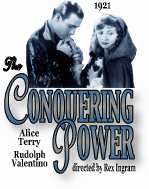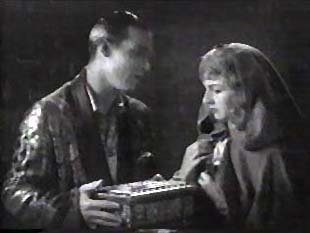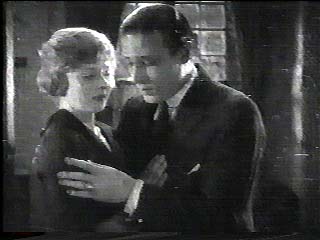

With the exception of "Four Horsemen of the Apocolypse," Rex Ingram's films seem to just border on being great but don't quite succeed. "The Conquering Power" is one of those films. It was his first release following "Four Horsemen," and he probably deserves some credit for not attempting to follow one epic with another one. Maybe he had learned a lesson from his idol D.W. Griffith's, experience.
Although "The Conquering Power"
is a small-scale story, it is moving and filled with emotions.
As a matter of fact, the opening title states, "In the story
of Eugenie Grandet, Balzac, a master word-painter of human emotions,
gave us all the elements that control man's destiny. Wealth, extravagance,
passion, failure, greed, dishonesty, poverty, patience, fear,
faith and love. The greatest of these is love - the all conquering
power." Alice Terry and Rudolph Valentino, both of whom were
enjoying a new found fame after the release of "Four Horsemen,"
give excellent performances, and Ingram no doubt saw in the Balzac
story an excellent opportunity to showcase Miss Terry's talents
- who, incidentally, would become his wife
later that year.
become his wife
later that year.
The story's presentation of Pére Grandet as the mean old miser, has somewhat of a fairy tale flavor to it. Ingram attempts to establish Pére's character with a scene early in the movie with an old man begging him for more time to repay a loan. The man pleads, "My wife is ill. It would kill her to lose our home." Of course, Pére shows no sympathy. Also, the scenes of Pére counting his money, running his fingers through the gold coins and even dropping a stream of coins over his head remind us of fairy tales we heard when very young.
One might even say the story is a little "soap opera-ish," too. Charles goes far away to seek his fortune. Eugenie's father doesn't want them to marry, so he devises a means to make each one think the other one has forgotten him/her. This results in years (we are never told how many, but Ingram makes it evident the two have aged significantly) apart. One can't help but wonder if a person is willing to give up the love of his/her life on the basis of a letter or a rumor, as was the case here. Stories in which the lover runs to the loved one's side to be told face to face that it's over make more sense. However, in "The Conquering Power," Charles receives a letter from Pére saying he has made arrangements for his daughter's marriage, and Charles never makes another attempt to contact his beloved Eugenie - not what one would expect from so passionate a love. Eugenie's lack of communication with Charles may be a little more understandable since she would have to defy her father in order to do so.
What is enjoyable about the film, though, is the casting. Terry and Valentino do a superb job of acting. In his book Rex Ingram, Master of the Silent Cinema (Barnes & Noble, 1980), author Liam O'Leary says, "In her day, Alice's own acting was regarded as 'adequate,' - a damning expression. She was felt to be cold and reserved." It is hard to understand why someone would have referred to Terry in such a manner. She is given plenty of opportunity for a range of acting styles in this film, and she does them all well.
When she first meets Charles, she gives a very restrained performance, as she should when enacting a first meeting between a man and woman who are immediately attracted to one another. And although restrained, we are well aware of the attraction she feels for Charles mainly due to Miss Terry's beautiful and expressive eyes.
Her most demanding scene in the movie is when her father learns she has given away her gold to Charles. From the panic on her face as she attempts to keep him from finding out through the terror she feels when he literally attacks her is "gut-wrenching" drama. Although Lillian Gish's peformance in "Broken Blossoms" will never be surpassed by anyone, this scene in "The Conquering Power" of a father attacking his terrified daughter has shades of "Broken Blossoms" written all over it.
Valentino is not given the screen time that
Terry is nor is he given the opportunity for the range of acting
that is given to Terry, but, nevertheless,  he
gives an excellent performance. His scenes with Terry, especially
when he tells her goodbye before leaving for the West Indies,
are moving and gentle. Valentino was, indeed, a very good actor.
Films such as "The Sheik," "The Eagle," and
"Son of the Sheik" are great fun, but it seems these
"tongue-in-cheek" stories can't be taken seriously enough
for us to give Valentino the acting credit he deserves. "The
Conquering Power" is one example of what an accomplished
actor he was and could have been more often if he'd only had the
chance.
he
gives an excellent performance. His scenes with Terry, especially
when he tells her goodbye before leaving for the West Indies,
are moving and gentle. Valentino was, indeed, a very good actor.
Films such as "The Sheik," "The Eagle," and
"Son of the Sheik" are great fun, but it seems these
"tongue-in-cheek" stories can't be taken seriously enough
for us to give Valentino the acting credit he deserves. "The
Conquering Power" is one example of what an accomplished
actor he was and could have been more often if he'd only had the
chance.
Ralph Lewis' performance must be mentioned, too - a performance that is much improved over his "mugging" as the Hon . Austin Stoneman in "The Birth of a Nation." That same stern, protruding bottom lip can still be seen in "The Conquering Power," but much less so and combined with more restrained acting otherwise. He is very effective as the stern father who is feared both by his wife and daughter, as well as the rest of the village. His scenes of madness when locked in the stone-walled room with all his gold are not silly or overdone, but very convincing.
As mentioned in the beginning, Ingram's films seem to border on great, but, for some reason, just don't quite earn that label. Actually, it may not be entirely Ingram's fault. John Seitz's photography is excellent, and, along with the sets, provides an appropriately moody and atmospheric visualization of the story. As mentioned, the casting is excellent. Also, as O'Leary commented, "It was a free adaption of the Balzac story with considerable modernisation and re-shuffling of character and incident" - changes which can be assumed were improvements.
So, with all this being so "right" about the film, why is it not "great?" The "culprit" seems to be the story itself, not in Ingram's handling of it. It is NOT a "great" story. The plot (two lovers separated by a misunderstanding and reunited many years later) is not original nor are the forces that play on them particularly convincing.
When the film was released, a reviewer from the New York Times praised Ingram's direction but strongly suggested that he look outside literary sources and find stories written directly for film. O'Leary noted, "This, of course, puts a finger on a perennial problem of the cinema, and on a particular weakness of Ingram's." That pretty much sums up why "The Conquering Power" is a good film and not a great one.
New York Evening Post
"It has an ease of continuity
that is soothing in effect; the tone shadings of its photography
seem equivalent to the elusive quality of sensuous music; and
Mr. Ingram's groups fall, dissolve and fall again into pictures
so well composed that one regrets the necessity for continuous
movement. These qualities make 'The Conquering Power' a film that
will bear seeing not only once but several times, and we make
bold to recommend it to those, if any, who are skeptical of the
screen as an instrument of beauty."
Liam O'Leary
"Above all it rendered homage to Ingram's great idol, D.W.
Griffith, whom he regarded as his master, as did so many other
intelligent and devoted directors. . . But the most interesting
comparison is with von Stroheim, who, we remember, was a friend
of Ingram, the one person in Hollywood he admired and trusted.
Von Stroheim thought highly of Ingram's work, and two years later
he elaborated the same theme in the masterpiece, 'Greed.' In both
films, gold is a corroding and destroying influence. In the original
version of 'Greed,' which was forty reels long, hallucination
plays a large part, and in the symbolic sequences of the film
gold is shown as a living evil presence. In the very powerful
scene were Grandet is trapped in his locked strong-room and feels
it closing in to destroy him, the cradle of gold comes alive,
breathing and sending up gaunt grasping hands to draw the miser
into it. Later in 'Greed,' von Stroheim was to use such scenes.
There is, too, a suggestion of perverse eroticism in 'The Conquering
Power' just as in the scene in 'Greed' where Trina pours the gold
coins over her naked body." (Rex Ingram, Master of the
Silent Cinema, by Liam O'Leary, Barnes & Noble, 1980)
Kevin Brownlow
"But Ingram was out of his time. He wanted to make what would
now be called 'art films' he followed 'The Four Horsemen'
with a jewel-like adaption of Balzac's 'Eugenie Grandet,' which
he called 'The Conquering Power.' It was not intended to duplicate
the success of 'The Four Horsemen,' nor did it. But he made too
many unusual and offbeat films compared to popular successes."
(Hollywood: The Pioneers, by Kevin Brownlow and John Kobal,
Alfred A. Knopf, 1979)
Return to "The Conquering Power" page
copyright 2000 by Tim Lussier, all rights reserved